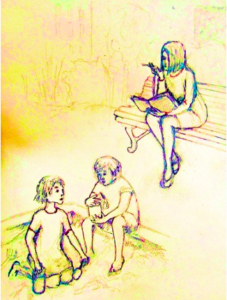Lesson plans, readings, and resources to inspire your students.
Enrich your classroom with The Common magazine: poems, essays, stories, and images that provide fresh, global perspectives on place and placelessness, home and belonging, migration and exile.
Thanks for submitting your email; we’ll be in touch soon with additional resources.
Lesson Plan: Group Assignment & Student-led Exercise
Divide students into small groups (trios work well) and give them a week to:
- Meet together outside of class with their copies of The Common in hand;
- Select, as a group, a poem they particularly like,
- Prepare to read that poem aloud to the class, and
- Design and lead an in-class writing exercise for their classmates and teacher that is inspired by a technique or aspect of that poem.
Example
One group chose Fatimah Asghar’s poem “Kul” from Issue 14, read the poem aloud, and noted that it was based on one word that could mean several, potentially opposite things – a contronym. The students had generated a list of contronyms in advance and projected them on the board (e.g., “sanction,” “oversight,” and “left”). They then invited their classmates to write at least a few lines of a poem that would, in their words, embrace these opposite meanings.
“I like this exercise not only because it gets students engaging with the fresh texts in detailed ways (at the same time we are all receiving and getting into our new issues) and working together, but also because it gives them a sense of what it is like to be in front of a class, teaching (potentially useful information for those who may be considering that path.)” – Amy Weldon
Adapted from Amy Weldon, Professor of English, Luther College
Lesson Plan: Discussion
Student-led discussion:
Ask student groups or individual students to lead discussions on essays and poems from a single issue, identifying specific attributes of place-based writing and how that might apply to their own writing and/or how they perceive the places they inhabit.
Workshops:
Ask students to read all the poems, stories, or essays in a single issue, and to discuss them as a group—how they fit together and/or form a cohesive group across the whole journal, almost as if discussing a collection of poems, stories, or essays by a single author. How do they fit together with the rest of the issue?
Assignment
Identify a poem (or story or essay) from the issue that uses memory to link a past and present experience with place; write a poem (or story or essay) that functions in a similar way, but draw from your own experience.
Adapted from Curtis Bauer, Associate Professor, Texas Tech University
« Teach The Common
Learn more about teaching The Common and request a free sample issue.












